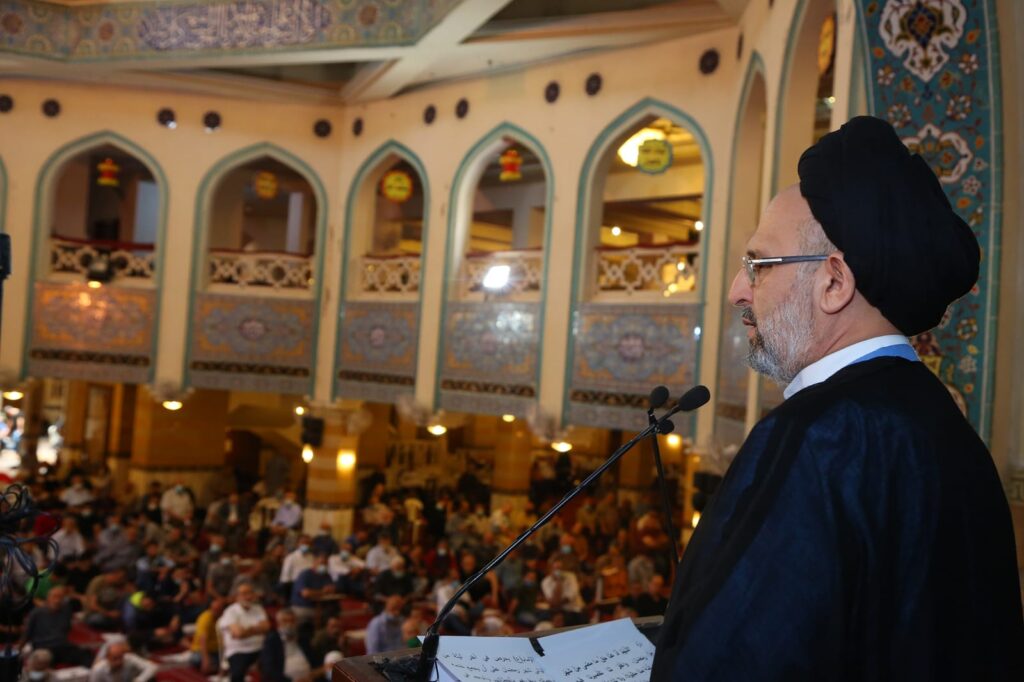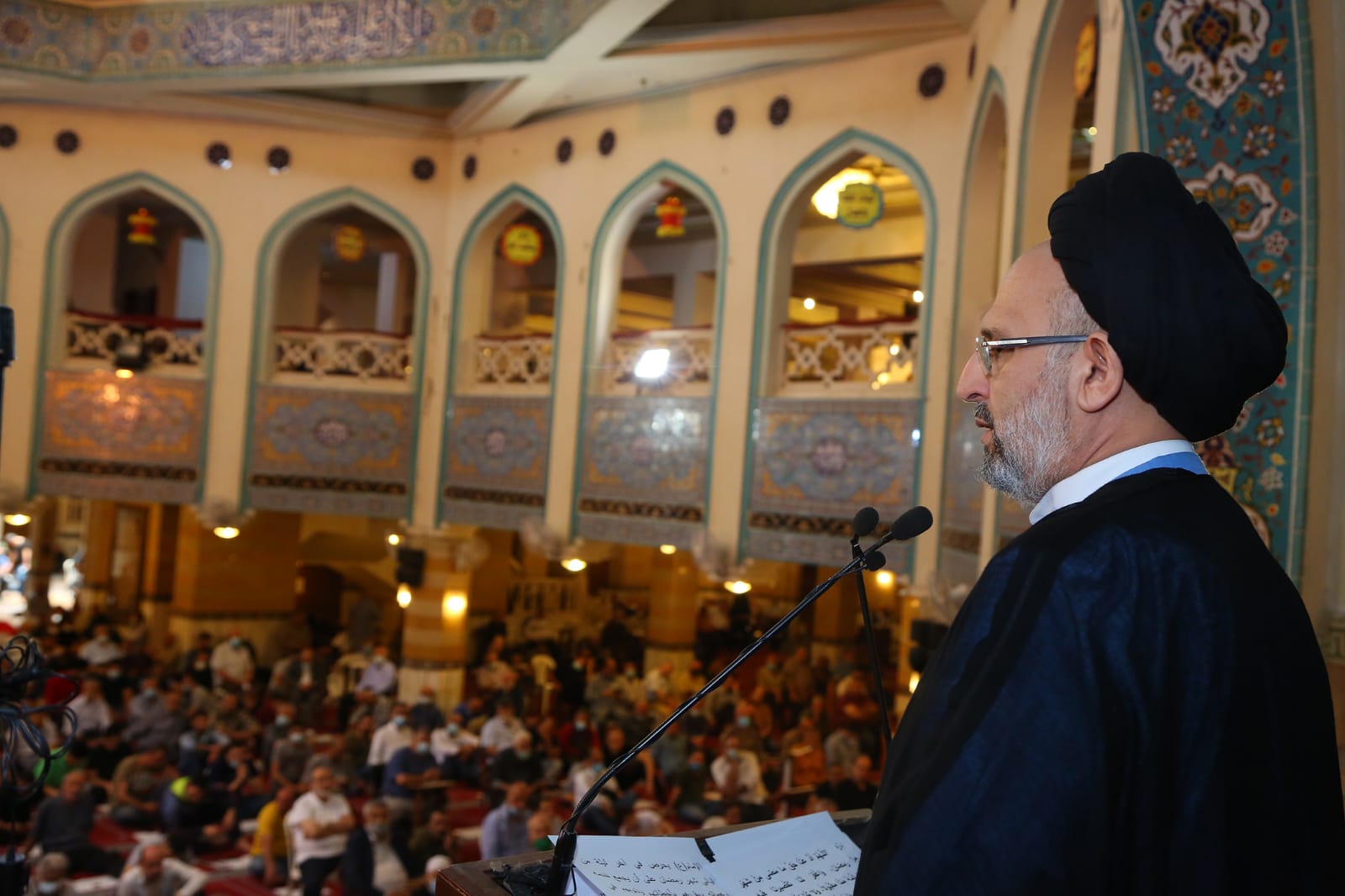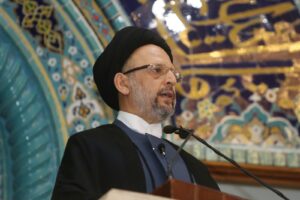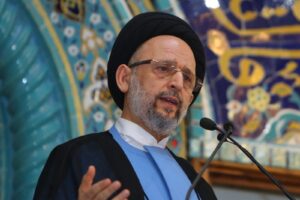Dealing with Fear: Trusting in God and Facing Reality
.
In the name of Allah, the Compassionate, the Merciful
His Eminence, Sayyed Ali Fadlallah, delivered the two Friday prayer sermons at the Imamain Al-Hassanain Mosque Muharram 16, 1447H/July 11, 2025. Several prominent religious scholars, dignitaries and hundreds of believers attended the Jumu’a prayer. Following is summary of his sermons
The first sermon
—
Dealing with Fear: Trusting in God and Facing Reality
Allah, the Most Exalted, says:
“When they hear news of safety or fear, they spread it without thought, but had they referred it to the Messenger or those in authority, those who know the truth would have understood it.” (Qur’an 4:83)
Fear is a natural human emotion experienced by all people without exception. It’s built into human nature to feel afraid when faced with something that threatens one’s life, health, dignity, or livelihood. In fact, fear can sometimes be necessary—such as fear of God, fear of committing sins, or failing in our religious duties. Allah, the Most Exalted, refers to this in the Qur’an:”Fear Me, if you are believers.” (Qur’an 3:175)
And: “They fear a Day whose evil is widespread.” (Qur’an 76:7)
This kind of fear can protect a person from wrongdoing and drive them to act cautiously and avoid danger.
However, fear becomes a problem when it controls a person or society, weakens their will, and leads them to make decisions that go against their values, principles, freedom, or dignity. It can also push people to run away from their responsibilities toward themselves, their society, or their nation. The Qur’an says that fear is one of the primary tools used by Satan:
“It is only Satan who frightens his followers. So do not fear them, but fear Me.” (Qur’an 3:175)
That’s why God urges believers not to blindly follow their fear. He calls on them to verify the news that causes panic, and to respond to it with rational thinking by consulting people who understand the reality, rather than those who spread fear or aim to break their spirit. As the verse says:
“When they hear news of safety or fear, they spread it without thought, but had they referred it to the Messenger or those in authority, those who know the truth would have understood it.” (Qur’an 4:83)
Often, people discover that what caused their fear wasn’t real or wasn’t as bad as they thought. On the other hand, when facing real dangers, they must remember that God is always present and capable of changing their condition for the better—if they seek His help and protection. As in Surat al-Falaq:
“Say: I seek refuge in the Lord of daybreak… from the evil of what He created, from darkness as it spreads, from the blowers in knots, and from the envy of the envious.”
Turning to God means remembering Him, reflecting on His power. He says:
“Remember Me, and I will remember you.” (Qur’an 2:152)
“Call upon Me, and I will respond to you.” (Qur’an 40:60)
“I am near. I respond to the caller when he calls upon Me.” (Qur’an 2:186)
“Whoever trusts in Allah—He is sufficient for him.” (Qur’an 65:3)
God not only promises His help but shows it clearly in the Qur’an as in the following examples:
Tإhe first: happened with Musa and Haroun (a.s.) when they feared Pharaoh. They said
“Our Lord, we fear he will hasten to punish us or transgress.”
But God said to them: “Do not be afraid; I am with you, hearing and seeing.” (Qur’an 20:45-46)
The Second: occurred with the Messenger of Allah (p.) when he migrated from Mecca to Medina. Quraysh pursued him at that time and almost reached him while he was in the cave. The one who was with him became afraid, so the Messenger of Allah (p.) said to him:
“Do not grieve”—meaning, do not be afraid—“Indeed, Allah is with us.” Then Allah saved him:
“So Allah sent down His tranquility upon him and supported him with soldiers you did not see, and made the word of those who disbelieved the lowest, while the word of Allah is the highest. And Allah is Exalted in Might and Wise.”
Third: happened after the setback that the Muslims experienced in the Battle of Uhud, and upon their return to Medina, news came to them that Abu Sufyan had decided to attack the city, thinking that the Muslims had been weakened due to the large number of martyrs and wounded, and what had happened to the Messenger of Allah (p.) himself—his incisor was broken and his head was wounded. But at that moment, fear did not paralyze them. Instead, they put their trust in Allah and all of them, even the wounded, went out to face what Abu Sufyan intended. Allah, the Exalted, referred to this when He said:
“Those to whom people said, ‘Indeed, the people have gathered against you, so fear them’—but it only increased them in faith, and they said, ‘Allah is sufficient for us, and He is the best disposer of affairs.’”
So the outcome was:
“So they returned with favor from Allah and bounty—no harm had touched them. And they pursued the pleasure of Allah. And Allah is the possessor of great bounty.”
(Āli ‘Imrān: 173–174)
Dear beloved, it is in the nature of life that we experience fear, hunger, and loss of wealth, lives, and fruits. Allah pointed to this when He said:
“And We will surely test you with something of fear and hunger and a loss of wealth and lives and fruits,”
And He called on us to face it with patience:
“But give glad tidings to the patient.”
(Al-Baqarah: 155)
But what we are called to do is to be cautious of those who work to manufacture fear in our reality—those who plant apprehensions within us until they paralyze us and prevent us from moving forward on the path that Allah has laid out for us. This calls us not to submit to such efforts, not to weaken, be defeated, panic, or retreat. Rather, we must embody what Allah has commanded us: patience and steadfastness, in a manner that enables us to think clearly and rationally, to examine the root causes of the problem and work toward solving it. Through it all, we must rely on our trust in Allah and our dependence on Him, and on His promise to support and strengthen us, so that we may attain what the patient are promised:
“Those who, when disaster strikes them, say, ‘Indeed, we belong to Allah, and indeed to Him we will return.
They are the ones upon whom are blessings from their Lord and mercy. And it is they who are rightly guided.”
And when He said:
“If you remain patient and conscious of God, their schemes will not harm you in the least.”
In the Name of Allah, the Compassionate, the Merciful
Worshippers of God, I advise you and myself to follow the example of Imam Zain al-Abidin (a.s.) when the people of Madinah rose up against Yazid. This led to the incident of Harrah, which took place on the 13th of Muharram in the year 63 AH, three years after the martyrdom of Imam Husein (a.s.).
At that time, Marwan ibn al-Hakam, who was leading the Umayyads in Madinah, sought to flee the city and searched for someone to entrust his family to. None agreed to take them in except Imam Zain al-Abidin (a.s.), despite everything Marwan had done to the Ahl al-Bait (a.s.) and his hatred toward them. Marwan had fought against Imam Ali (a.s.) at Jamal and Siffin, prevented Imam Husein (a.s.) from burying his brother al-Hassan (a.s.) next to their grandfather the Messenger of God (p.), and advised the governor of Madinah to arrest Hussein and force him to pledge allegiance to Yazid—or else to kill him.
Yet Imam Zain al-Abidin (a.s.) did not respond with vengeance. He acted from his faith and humanitarianism, which is beautifully expressed in the poet’s words:
We ruled, and forgiveness was our nature;
You ruled, and blood flowed like rivers.
You killed captives, though we would pardon and spare.
This is the difference between us—
Every vessel pours forth what is inside it.
One of Marwan’s daughters later remarked:
“By God, we received such care and attention from Imam Zain al-Abidin (a.s.)—even more than we received from our own father.”
Dear brothers and sisters, more than ever, we need to draw inspiration from the morals of the Ahl al-Bait (a.s.), through which they won hearts—even the hearts of their enemies. Through such character, we open the hearts of others to us and become more aware, more responsible, and better equipped to face challenges
We begin with the ongoing aggression against Lebanon, which we’ve seen through airstrikes on new areas in the south and Beqaa, and through assassinations—now reaching the north for the first time—alongside surveillance drones flying over Lebanese regions and the continued targeting and destruction of border villages.
All of this aims to intensify pressure on the Lebanese state and people, to coerce them into submission to the enemy’s dictates, which endanger the country’s security, sovereignty, and future.
In this context comes the visit of the American envoy tasked with following the Lebanese file, seeking to obtain Lebanon’s response to the primary demand: to disarm the resistance and push Lebanon to join the regional normalization process, promising supposed benefits in return.
The unified Lebanese response, issued by the three branches of government, pointed out Lebanon’s positive steps in implementing the terms of the agreement—while the Zionist enemy failed to uphold even the bare minimum, increasing its aggression instead. The reply called on the U.S. to pressure Israel to halt its attacks and withdraw. Only then, if any demands remain, the Lebanese themselves are capable of addressing them.
Thus, Lebanon remains on edge, awaiting the American response—one we fear may be negative due to Israel’s stubbornness and insistence on treating Lebanon as a weak party to be dictated to.
In light of all this, we once again stress the importance of maintaining a unified official stance, and we call on all Lebanese to rally around and support it—instead of undermining it—so we can end the occupation and aggression and restore full sovereignty to our land. This can only happen through national unity, grounded in the country’s best interests and collective strength.
It is regrettable that some continue to bet on the enemy and its demands to strengthen their political position, even at the expense of Lebanon’s unity, sovereignty, and security. But it is known that this enemy has never served any sect, group, or political faction—its goal has always been its own dominance over Lebanon and the entire region.
At this historic moment, as new regional maps are being drawn, the Lebanese must rise to the challenge and protect themselves from its consequences. Let them not be lured by those urging them to jump aboard the so-called regional train before it departs—because the Lebanese know all too well that it won’t bring them closer to reclaiming their rights. All past experiences have proven this.
Meanwhile, the Lebanese people continue to wait for government action to lift the country out of its current economic and living crisis. Salary increases alone are not enough, as they fall short of covering basic needs and are quickly swallowed up by price hikes.
We again urge the government to fulfill its promises regarding reconstruction. While we understand the intense pressures Lebanon faces—especially the politicization of this humanitarian file that affects thousands of families who lost their homes. The state must seek alternatives to overcome this increasingly unbearable reality.
And we turn to the ongoing tragedy in Gaza, now mirrored in the West Bank, where the Zionist enemy continues its campaign of genocide—despite ongoing ceasefire negotiations. The enemy is delaying to buy more time for further killing and destruction, with the goal of eliminating the Palestinian cause.
However, it faces both internal exhaustion from the heroic operations of the resistance and external backlash as its international reputation continues to deteriorate—even among the very nations that support it.
This calls for real Arab and Muslim action to pressure those countries to stop aiding this genocide. The time has come to recognize the grave danger of what’s happening in Palestine—danger that no one will be spared from.
Finally, we condemn the recent attack in Syria that targeted a religious scholar there, Shaykh Rasoul Muhammad Shahoud. We call for a serious investigation to prevent such crimes from recurring and for those responsible to be held accountable—out of concern for national unity, security, and stability, and for the emergence of a state that protects all its citizens, in their full religious, sectarian, and national diversity.
–





